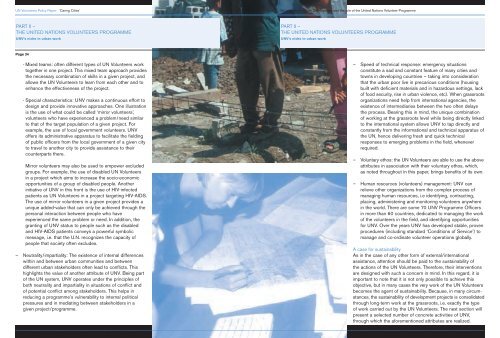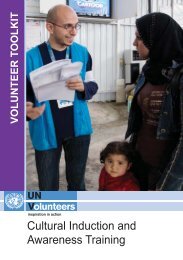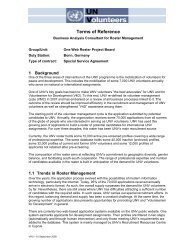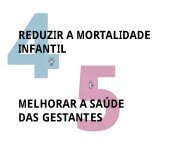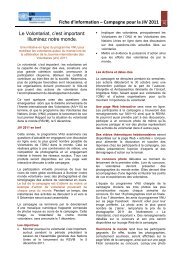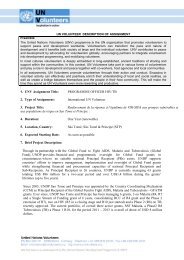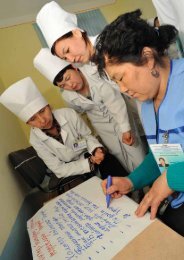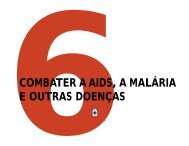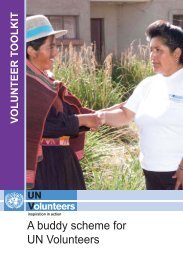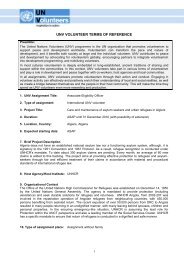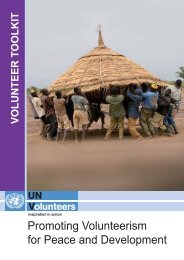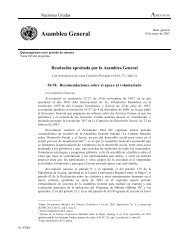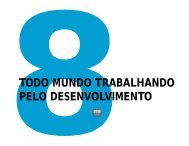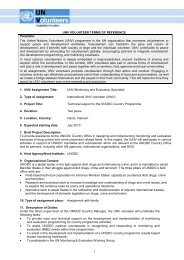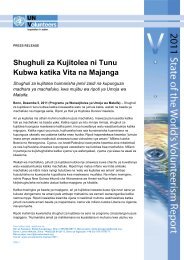View associated PDF document - United Nations Volunteers
View associated PDF document - United Nations Volunteers
View associated PDF document - United Nations Volunteers
Create successful ePaper yourself
Turn your PDF publications into a flip-book with our unique Google optimized e-Paper software.
UN <strong>Volunteers</strong> Policy Paper<br />
‘Caring Cities’<br />
Volunteering in Urban Development and the role of the <strong>United</strong> <strong>Nations</strong> Volunteer Programme<br />
PART II –<br />
THE UNITED NATIONS VOLUNTEERS PROGRAMME<br />
UNV’s niche in urban work<br />
PART II –<br />
THE UNITED NATIONS VOLUNTEERS PROGRAMME<br />
UNV’s niche in urban work<br />
Page 34<br />
- Mixed teams: often different types of UN <strong>Volunteers</strong> work<br />
together in one project. This mixed team approach provides<br />
the necessary combination of skills in a given project, and<br />
allows the UN <strong>Volunteers</strong> to learn from each other and to<br />
enhance the effectiveness of the project.<br />
- Special characteristics: UNV makes a continuous effort to<br />
design and provide innovative approaches. One illustration<br />
is the use of what could be called ‘mirror volunteers’,<br />
volunteers who have experienced a problem/need similar<br />
to that of the target population of a given project. For<br />
example, the use of local government volunteers. UNV<br />
offers its administrative apparatus to facilitate the fielding<br />
of public officers from the local government of a given city<br />
to travel to another city to provide assistance to their<br />
counterparts there.<br />
Mirror volunteers may also be used to empower excluded<br />
groups. For example, the use of disabled UN <strong>Volunteers</strong><br />
in a project which aims to increase the socio-economic<br />
opportunities of a group of disabled people. Another<br />
initiative of UNV in this front is the use of HIV-infected<br />
patients as UN <strong>Volunteers</strong> in a project targeting HIV-AIDS.<br />
The use of mirror volunteers in a given project provides a<br />
unique added-value that can only be achieved through the<br />
personal interaction between people who have<br />
experienced the same problem or need. In addition, the<br />
granting of UNV status to people such as the disabled<br />
and HIV-AIDS patients conveys a powerful symbolic<br />
message, i.e. that the U.N. recognizes the capacity of<br />
people that society often excludes.<br />
– Neutrality/impartiality: The existence of internal differences<br />
within and between urban communities and between<br />
different urban stakeholders often lead to conflicts. This<br />
highlights the value of another attribute of UNV. Being part<br />
of the UN system, UNV operates under the principles of<br />
both neutrality and impartiality in situations of conflict and<br />
of potential conflict among stakeholders. This helps in<br />
reducing a programme’s vulnerability to internal political<br />
pressures and in mediating between stakeholders in a<br />
given project/programme.<br />
Page 35<br />
– Speed of technical response: emergency situations<br />
constitute a sad and constant feature of many cities and<br />
towns in developing countries – taking into consideration<br />
that the urban poor live in precarious conditions (housing<br />
built with deficient materials and in hazardous settings, lack<br />
of food security, rise in urban violence, etc). When grassroots<br />
organizations need help from international agencies, the<br />
existence of intermediaries between the two often delays<br />
the process. Bearing this in mind, the unique combination<br />
of working at the grassroots level while being directly linked<br />
to the international system allows UNV to tap directly and<br />
constantly from the informational and technical apparatus of<br />
the UN, hence delivering fresh and quick technical<br />
responses to emerging problems in the field, whenever<br />
required.<br />
– Voluntary ethos: the UN <strong>Volunteers</strong> are able to use the above<br />
attributes in association with their voluntary ethos, which,<br />
as noted throughout in this paper, brings benefits of its own.<br />
– Human resources (volunteers) management: UNV can<br />
relieve other organizations from the complex process of<br />
managing human resources, i.e identifying, contracting,<br />
placing, administering and monitoring volunteers anywhere<br />
in the world. There are some 70 UNV Programme Officers<br />
in more than 60 countries, dedicated to managing the work<br />
of the volunteers in the field, and identifying opportunities<br />
for UNV. Over the years UNV has developed stable, proven<br />
procedures (including standard ‘Conditions of Service’) to<br />
manage and co-ordinate volunteer operations globally.<br />
A case for sustainability<br />
As in the case of any other form of external/international<br />
assistance, attention should be paid to the sustainability of<br />
the actions of the UN <strong>Volunteers</strong>. Therefore, their interventions<br />
are designed with such a concern in mind. In this regard, it is<br />
important to note that it is not only possible to achieve this<br />
objective, but in many cases the very work of the UN <strong>Volunteers</strong><br />
becomes the agent of sustainability. Because, in many circumstances,<br />
the sustainability of development projects is consolidated<br />
through long-term work at the grassroots, i.e. exactly the type<br />
of work carried out by the UN <strong>Volunteers</strong>. The next section will<br />
present a selected number of concrete activities of UNV,<br />
through which the aforementioned attributes are realized.


